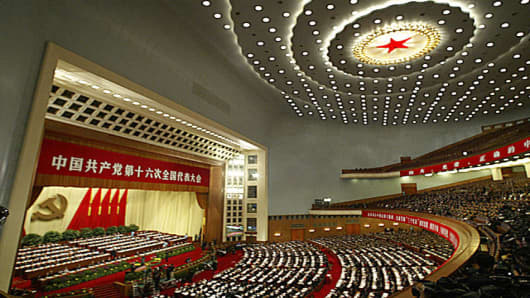China's Communist Party must stay firmly in charge as the nation embraces economic and social change, President Hu Jintao said on Monday in an agenda-setting speech vowing tightly controlled political reform.
In a "state of the nation" work report to the 17th Party Congress, Hu said the country he has led for five years would pursue an increasingly open economy and also faced social fissures and an environment battered by breakneck growth.
But Hu said the country's future was promising -- and even some political loosening was possible -- as long as the Communist Party maintained its long-unchallenged domination.
"China is going through a wide-ranging and deep-going transformation. This brings us unprecedented opportunities as well as unprecedented challenges," Hu told 2,200 delegates packed into the cavernous Great Hall of the People.
"We must uphold the Party's role as the core of leadership in directing the overall situation and coordinating the efforts of all quarters."
The five-yearly Congress is a chance for the Party to spell out his broad agenda for the next five years, and to bring fresh recruits into the leadership who will enforce its policies and probably emerge as top leaders five years hence.
Hu used his report to argue that the Party's firm control and his policies to share prosperity and temper breakneck growth offered a map to make the country richer, stronger and more stable.
As the economy grew, the Party would also allow the country's increasingly diverse and often restive citizens to have a bigger say in their own government, he said.
"Citizens' participation in political affairs will expand in an orderly way," he said. "Power must be exercised in the sunshine to ensure that it is exercised correctly."
Hu promised to develop a more technologically sophisticated defence force staffed by well-trained professionals.
But he suggested that China's international environment was generally benign and offered an olive branch to Taiwan, the self-ruled island that Beijing claims as its own.
Corruption A Threat
Hu has presided over five years of rapid growth during which China has become a major economic and diplomatic power, an emergence that will be sealed with its hosting of the 2008 Olympics in Beijing. As if on cue, China's main stock market rose above 6,000 points for the first time.
But China is also facing serious challenges to its model of development, including a huge gap between rich and poor, widespread environmental degradation and official corruption, all of which are fuelling social unrest.
After ousting former Shanghai Party boss Chen Liangyu last year over corruption, in his report Hu warned that graft threatened the Party's very survival.
Since he succeeded Jiang Zemin as Party chief in 2002, Hu has promoted a "harmonious society" that grafts efforts to spread wealth more equally on to the nation's market-driven economy.
That slogan and Hu's "scientific outlook of development" that aims to balance growth with environmental sustainability are set to be written into Party documents, a victory for Hu in a system where ideological formulas are a currency of political power.
Speaking for more than two hours in the Great Hall, which was decked out in red and draped with the hammer and sickle, Hu indicated he would pursue more balanced growth.
Jiang, 81, was also on the stage when Hu gave his report, but he appeared unwilling to summon much enthusiasm for his successor's vision, often dozing off or clapping only listlessly.
Hu said China, under fire from abroad over its record trade surpluses, must wean the economy off exports and investment to rely more on consumer spending. At the same time, China needed to clamber up the technology ladder.
Hu repeated concerns about the growing gap between rich and poor, a flashpoint for social unrest and a problem serious enough that analysts said it may spur tentative political reforms.
"His comment on enhancing ways that citizens can be involved suggests that one of the ways in which you enhance stability is by getting citizens more involved in politics," said David Zweig, of the Hong Kong University of Science and Technology.
But participation is unlikely to come at the cost of the Party's control. Dissidents have been detained and thousands of petitioners rounded up to stop them lobbying officials directly with calls for justice.
Police were out in force for the Congress, outside major hotels hosting delegates and around Tiananmen Square, the political heart of China.
"Look at all those police," observed cab driver Wang Jiandong. "Not even a bird could fly over."


